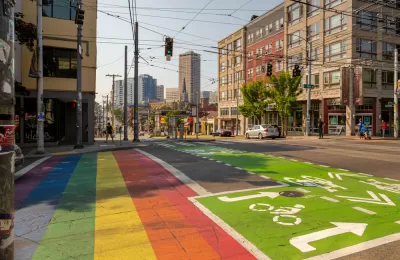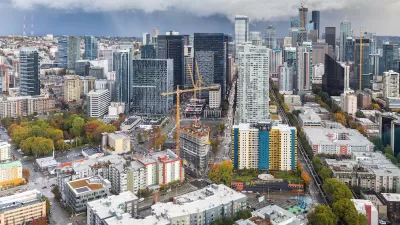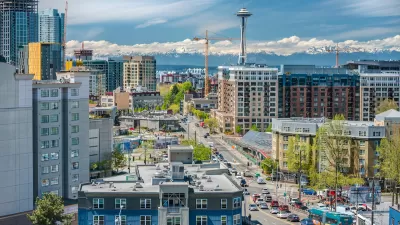A proposed transportation impact fee, years in the making, is stirring a controversy at a time of declining permitting and construction activity in the city of Seattle.

The Seattle City Council is considering transportation impact fees for development in the city.
Reporting for The Urbanist, Ryan Packer shares the background on a years-long process of exploring a new transportation impact fee, which has recently yielded a potential project list before the City Council for consideration.
Notably, Seattle has no existing impact fee—for transportation, fire protection, nor schools—like most cities in Washington State, according to Packer. Hence the cities ongoing efforts, dating back to 2014, to implement an impact fee.
There’s one big catch, however, to the idea of adding a charge on new residential or commercial construction to help fund infrastructure improvements: At the moment impact fees are under consideration by the City Council, “the City of Seattle is facing a revenue forecast that shows multifamily home construction slowing significantly, prompting the question of whether the timing is right to add yet another cost barrier onto the construction of new housing,” writes Packer.
The impact fee is currently held up by legal challenges to the Determination of Non-Significance (DNS) required by the Washington State Environmental Protection Act (SEPA).
“Until that appeal is resolved (a hearing is now scheduled for late May), Seattle cannot move beyond the initial rate study for impact fees, which includes a potential ceiling for the fee. Only certain transportation projects are eligible to be funded by impact fees, and often only certain elements of those projects as well,” reports Packer.
Impact fees are frequently provoke opposition from developers and YIMBYs for creating another expense for development projects. A lot more detail about the politics and potential consequences of the proposed impact fee can be found at the link below.
FULL STORY: As Development Slows, Seattle Eyes Transportation Impact Fee Projects

Study: Maui’s Plan to Convert Vacation Rentals to Long-Term Housing Could Cause Nearly $1 Billion Economic Loss
The plan would reduce visitor accommodation by 25,% resulting in 1,900 jobs lost.

North Texas Transit Leaders Tout Benefits of TOD for Growing Region
At a summit focused on transit-oriented development, policymakers discussed how North Texas’ expanded light rail system can serve as a tool for economic growth.

Why Should We Subsidize Public Transportation?
Many public transit agencies face financial stress due to rising costs, declining fare revenue, and declining subsidies. Transit advocates must provide a strong business case for increasing public transit funding.

How Community Science Connects People, Parks, and Biodiversity
Community science engages people of all backgrounds in documenting local biodiversity, strengthening connections to nature, and contributing to global efforts like the City Nature Challenge to build a more inclusive and resilient future.

Alabama: Trump Terminates Settlements for Black Communities Harmed By Raw Sewage
Trump deemed the landmark civil rights agreement “illegal DEI and environmental justice policy.”

Dear Tesla Driver: “It’s not You, It’s Him.”
Amidst a booming bumper sticker industry, one writer offers solace to those asking, “Does this car make me look fascist?”
Urban Design for Planners 1: Software Tools
This six-course series explores essential urban design concepts using open source software and equips planners with the tools they need to participate fully in the urban design process.
Planning for Universal Design
Learn the tools for implementing Universal Design in planning regulations.
City of Santa Clarita
Ascent Environmental
Institute for Housing and Urban Development Studies (IHS)
City of Grandview
Harvard GSD Executive Education
Toledo-Lucas County Plan Commissions
Salt Lake City
NYU Wagner Graduate School of Public Service





























